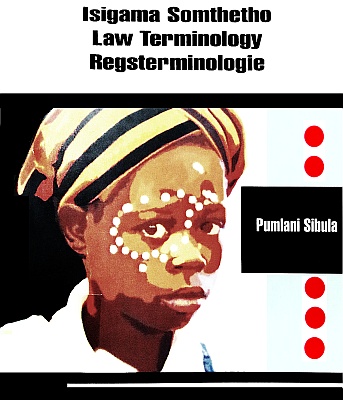
Law terminology / lsigama somthetho / Regsterminologie [click to download]
PREFACE
This trilingual list on Law Studies terminology aims to promote isiXhosa and to support Xhosa-speaking students who sometimes struggle with difficult Law terms. The terminology list, therefore, is an initiative to support and assist these students. It aims to widen the scope of understanding, so that these students are afforded the opportunity to learn and understand these Law terms through their mother tongue. One of the direct outcomes of this endeavour is the intention to elevate isiXhosa to the status of a language of learning in higher institutions. This terminology list is also one of the strategies for highlighting the fact that Stellenbosch University is committed to the promotion of isiXhosa, which is one of the three official languages in the Western Cape.
This terminology list has 283 word entries, which are presented in a user-friendly manner. It is divided into four sections: (i) Introduction to Law; (ii) Family Law; (iii) Customary Law; (iv) Criminal Law. Since Law contains many Latin terms, Latin phrases are used without being translated. This approach is followed in all three languages used in this booklet: English, isiXhosa and Afrikaans.
ACKNOWLEDGEMENTS
This terminology list is the result of cooperation between the Faculty of Law and the Language Centre’s Unit for isiXhosa. I sincerely commend lecturers at the Faculty of Law at the Ou Hoofgebou. The love, kindness and approachability that they displayed during this endeavour are much appreciated. I salute the following persons for their immense contribution to this initiative:
- Ms Deirdré Roos, a freelance translator, who made additions to the Afrikaans terms used in this booklet. Her contribution made it possible for this terminology list to be trilingual.
- Mr Mzo Tshaka, an attorney by occupation, for evaluating whether the isiXhosa used in this booklet is relevant to Law concepts in general.
- Mr Mhlobo Jadezweni, for helping in investigating and editing isiXhosa terms, and comparing them with English and Afrikaans terms.
- Mr[s] Ebrezia Johnson, who is a lecturer of Law Studies at the Ou Hoofgebou. [Sh]e compared the Afrikaans and English terms.
- I am very grateful for the enormous contribution of the Language Service. Their translation, editing, quality control, facilitation and the implementation of the plan facilitated the publication of this work.
- It is my honour to express my gratitude to the Department of African Languages, particularly Prof. Marianna Visser, for facilitating the realisation of this terminology list through initiating this project between the Unit for isiXhosa and the Faculty of Law.